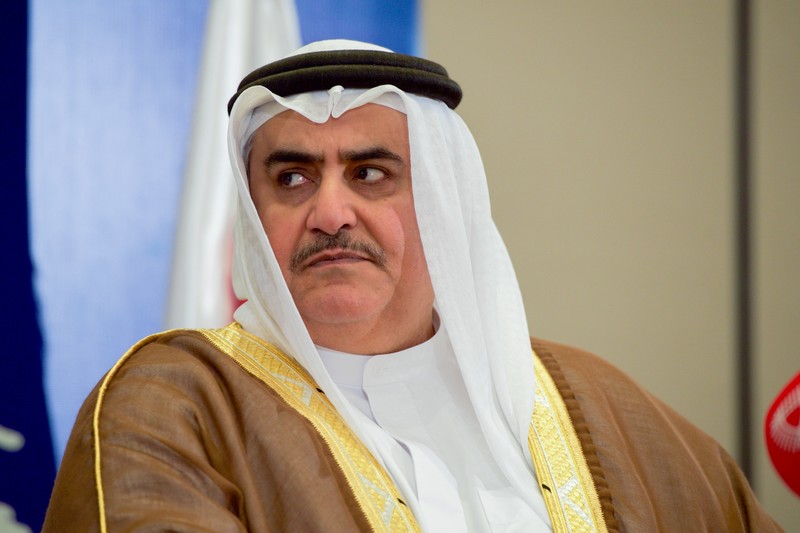“Israel is a country in the region, in the Middle East, the State of Israel” : Bahraini FM
While recognizing Israel as a country and a state, the minister remained non-committal about diplomatic representation, without Israel’s peace agreement with the Palestinians
Photo: US Department of State

Bahrain’s foreign minister Khalid bin Ahmed Al Khalifa.
The Foreign Minister of Bahrain, Shaikh Khalid bin Ahmed bin Mohammed Al-Khalifa, gave his very first interview to Israeli journalists in Manama on the sidelines of a peace conference the country hosed on June 26, titled “Peace to Prosperity” for presenting an economic blueprint to resolve the Israeli-Palestinian conflict.
This was the very first time that journalists from Israel were allowed in Bahrain to cover an event.
In the interview to The Times of Israel the minister is quoted as having said “We appreciate that you [journalists] accepted our invitation. It’s been something that we always wanted to do. Because we felt that communicating to the Israelis, through your media, is an essential part of building trust in the minds of people in the Arab world who always aim for peace.” he said. “We do want the world to see Bahrain; especially you from Israel, to come and see Bahrain.”
The paper said that the minister wanted “better relations and eventually ‘peace’ with Israel” which was “a part of the [Middle East] region and “there to stay”.
The minister is also reported to have asked why people had been surprised when in May 2018 – following an Israeli airstrike on Iranian targets in Syria – he wrote on Twitter that as long as Tehran continues its regional aggression, “any country – including Israel – has the right to defend itself by eliminating the source of danger.” He was reported as explaining his tweet by noting that while the Arab-Israeli conflict was “political”, it was “religious zeal” that drove Iran to place their “rockets and threats” close to Israel’s border and Arab territory.
The minister further declared that “.. every country affected [has the right to defend itself against such aggression], and I meant it when I said, ‘including Israel.’ Because you’re a country in the region. It has nothing to do with our issues between the Arabs and the Israelis. But [Iran] wants to exacerbate it and make it more toxic by making it religious. Everybody has the right to defend itself.”
The minister said that “As in many parts of the Arab world, we have a joint heritage of cohabitation. Jews and Arabs. We come from the same background, in the past. Whether it’s Baghdad, or the Levant, or the Maghreb, or Egypt, or Iran, or everywhere. This is where we lived together. And you saw the embodiment of that in the old synagogue. And we stress it’s an old one. It’s not something that we created because of the presence of expats. No, it’s for citizens of our country. And that means a lot to us.”
To a question on the conference Peace to Prosperity, which the Palestinians boycotted, Minister Al-Khalifa responded that Bahran would ‘continue to work with the Palestinian Authority,’ and had seen a “very good opportunity in this workshop for them, to benefit from it. It’s not the first economic effort being given to them.” Recalling that there were similar opportunities in the past, he said that Bahrain saw this conference as “very, very important. As much as Camp David 1 was a major game changer, after the visit of [Egyptian] President [Anwar] Sadat [to Jerusalem in 1977] – if this succeeds, and we built on it, and it attracts attention and momentum, this would be the second game changer.” However, he said that he did not yet know about the political part of the US peace proposal for the Palestinians and will have to wait, but would accept whatever Israel can agree on with the Palestinians.
When told that Palestinians would not accept anything less than sovereignty, minister Khalifa responded that the Palestinians had agreed to “land swaps” and that they are still willing to talk about it and Bahrain would encourage them to do so. “Because some of the territory in the West Bank is now occupied by settlements that grew to become cities. Agreed swaps. They are willing to talk about it. We will encourage them to do that. But at the end will not be able to come and force anything on the Palestinians,” he said.
While recognizing Israel as a country and a state – “Israel is a country in the region, in the Middle East, the State of Israel” – the paper quoted him saying, he remained non-committal about diplomatic representation.
When asked if there was any chance that Israel and Bahrain would establish diplomatic relations, even if there’s no peace agreement with the Palestinians, the minister responded by saying that Bahrain was committed to the Arab Peace Initiative, and that “as much as there are shortcomings and missed opportunities by everyone here, this is one missed opportunity for Israel [but] they can always [change] their position on it.”
Calling diplomatic representation ‘symbolic’, he said that without “the foundations of prosperity and cooperation”, what can diplomatic entity do, urging Israel to build trust. “Let’s build confidence, and let’s build trust.”
Saying he also wanted to win their trust of the Palestinians, he added that he wanted the “Israeli public to trust that there are more than one or two or three voices in the Arab world that are aiming for peace. That they are not surrounded by enemies. But they are surrounded by people who will want to achieve a just peace that would make everybody comfortable.”
1 thought on ““Israel is a country in the region, in the Middle East, the State of Israel” : Bahraini FM”